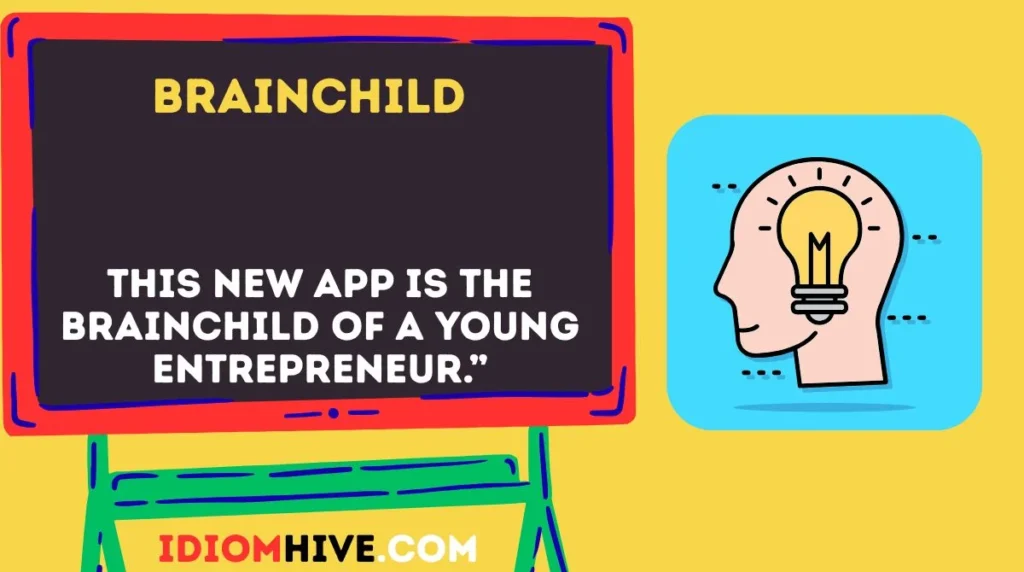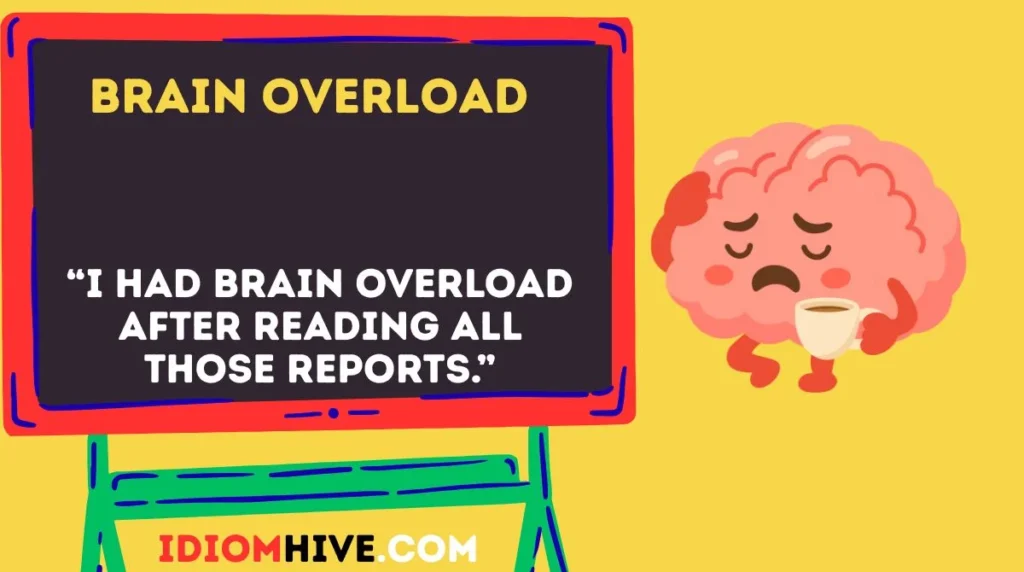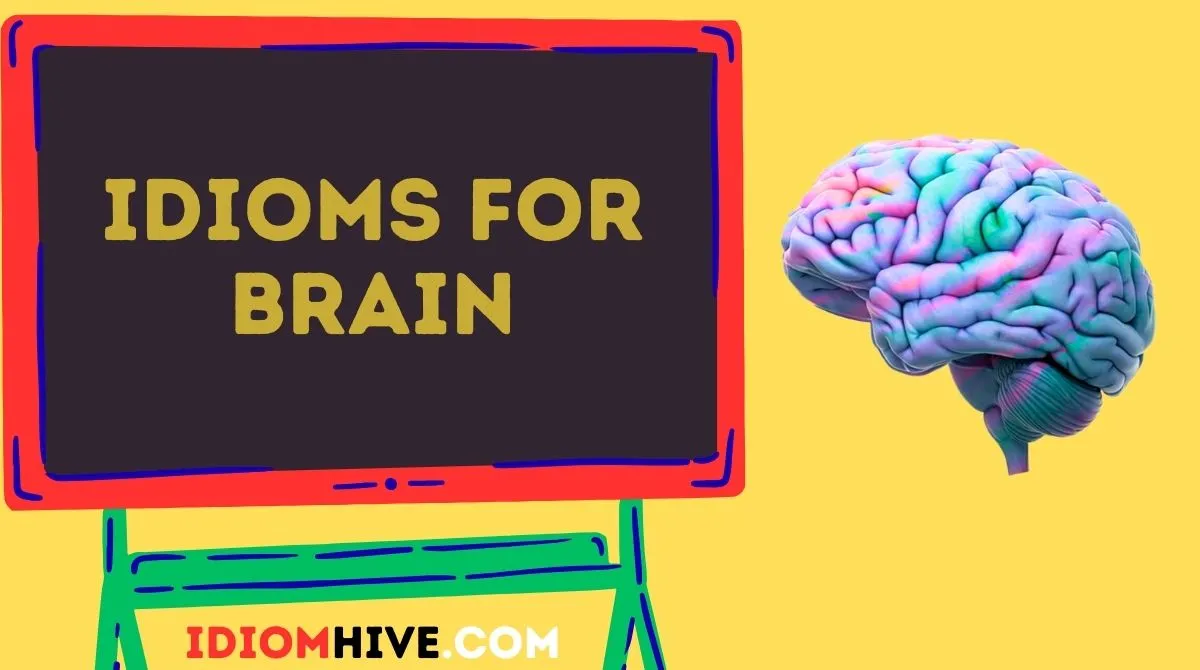The English language is full of colorful idioms—phrases that don’t always mean what the words literally say but carry a deeper or cultural meaning. Idioms make speech richer, more creative, and engaging.
When it comes to the brain, idioms often reflect intelligence, quick thinking, problem-solving, or sometimes the opposite!
Learning idioms for the brain is useful because they help you describe people’s mental abilities, creative skills, and thought processes in everyday conversations, stories, and even professional settings.
Whether you want to praise someone’s cleverness, describe your brainstorming session, or gently poke fun at forgetfulness, idioms about the brain will help you speak English more naturally and expressively.
Let’s explore a wide collection of these fascinating expressions that highlight the power, quirks, and mysteries of the human mind.
Did You Know?
The word “brainstorm” was first used in the late 1800s, but it originally meant “a sudden fit of madness.” Over time, the meaning changed into something more positive—“a sudden burst of creative ideas.” This shows how idioms evolve with culture and time!
Idioms That Show Intelligence and Clever Thinking
Brainchild

Meaning: A creative idea or invention.
Sentence Example: “This new app is the brainchild of a young entrepreneur.”
Alternative: Stroke of genius.
Note: Often used in professional and creative settings.
Brainwave
Meaning: A sudden clever idea.
Sentence Example: “I had a brainwave and solved the puzzle instantly.”
Alternative: Light-bulb moment.
Note: Informal, used when you suddenly think of a smart solution.
Pick Someone’s Brain
Meaning: To ask someone knowledgeable for advice.
Sentence Example: “Can I pick your brain about this project?”
Alternative: Tap into someone’s knowledge.
Note: Common in business or academic discussions.
Rack Your Brains
Meaning: To think very hard about something.
Sentence Example: “I racked my brains but couldn’t remember her name.”
Alternative: Beat your brains out.
Note: Used in both casual and formal contexts.
Brain Like a Sieve
Meaning: A very poor memory.
Sentence Example: “I forgot again—I’ve got a brain like a sieve!”
Alternative: Absent-minded.
Note: Informal, often used humorously.
Brainbox
Meaning: A very intelligent person.
Sentence Example: “She’s a real brainbox when it comes to math.”
Alternative: Bright spark.
Note: Mostly British English, casual compliment.
Brainpower
Meaning: Mental ability and intelligence.
Sentence Example: “This task requires a lot of brainpower.”
Alternative: Intellectual strength.
Note: Formal or informal; often used in professional settings.
Have Something on the Brain
Meaning: To be obsessed with something.
Sentence Example: “He’s got football on the brain all day long.”
Alternative: Stuck in your head.
Note: Used informally about habits or obsessions.
Brainstorm
Meaning: To generate creative ideas.
Sentence Example: “Let’s brainstorm some solutions for the problem.”
Alternative: Ideate.
Note: Common in workplaces, schools, and team discussions.
Wrap Your Brain Around
Meaning: To try hard to understand something complex.
Sentence Example: “I’m still wrapping my brain around this math problem.”
Alternative: Get your head around.
Note: Casual and conversational.
Idioms About Forgetfulness and Confusion
Scatterbrained
Meaning: Forgetful and disorganized.
Sentence Example: “She’s so scatterbrained she forgot her own birthday!”
Alternative: Absent-minded.
Note: Informal, sometimes teasing.
Birdbrain
Meaning: A silly or unintelligent person.
Sentence Example: “Don’t be such a birdbrain—it’s easy to do.”
Alternative: Airhead.
Note: Informal and slightly insulting.
Brains in Neutral
Meaning: Not paying attention, mind is idle.
Sentence Example: “Sorry, I had my brains in neutral during the meeting.”
Alternative: Zoning out.
Note: Casual, often used humorously.
Brain Fade
Meaning: A temporary mental block or lapse.
Sentence Example: “I had a brain fade and forgot the password.”
Alternative: Mental blank.
Note: Informal, often in sports or studies.
Brain Freeze
Meaning: Temporary mental block or inability to think.
Sentence Example: “I got a brain freeze during the exam.”
Alternative: Blank out.
Note: Used informally; also refers to the headache from eating ice cream.
Brain Drain
Meaning: The emigration of skilled people to another country.
Sentence Example: “The company is worried about a brain drain.”
Alternative: Talent flight.
Note: Common in news, formal contexts.
Brain Fog
Meaning: Mental confusion or lack of clarity.
Sentence Example: “I couldn’t focus; I had brain fog all day.”
Alternative: Mental haze.
Note: Informal, often linked to tiredness or illness.
Foggy Brain
Meaning: Confused or unclear thinking.
Sentence Example: “After the surgery, she complained of a foggy brain.”
Alternative: Clouded mind.
Note: Similar to brain fog, used in casual speech.
Lose Your Train of Thought
Meaning: To forget what you were saying.
Sentence Example: “I lost my train of thought during the presentation.”
Alternative: Mind went blank.
Note: Common in both formal and casual conversations.
Empty-Headed
Meaning: Lacking intelligence or seriousness.
Sentence Example: “That empty-headed remark offended everyone.”
Alternative: Foolish.
Note: Informal, often negative.
Idioms About Wisdom and Mental Strength
Use Your Brain
Meaning: To think carefully and logically.
Sentence Example: “Come on, use your brain before making that choice.”
Alternative: Think wisely.
Note: Common in both casual and serious talk.
Brain Trust
Meaning: A group of experts advising a leader.
Sentence Example: “The president surrounded himself with a brain trust.”
Alternative: Advisory board.
Note: Formal, often used in politics.
Brain Teaser
Meaning: A puzzle that requires thought.
Sentence Example: “This crossword is a real brain teaser.”
Alternative: Riddle.
Note: Informal, educational, or playful.
Brainy
Meaning: Very intelligent.
Sentence Example: “She’s the brainy one in the family.”
Alternative: Clever.
Note: Casual compliment.
Sharpen Your Brain
Meaning: To improve your thinking ability.
Sentence Example: “Reading daily helps you sharpen your brain.”
Alternative: Train your mind.
Note: Encouraging, often used in educational advice.
Rack One’s Brainpan
Meaning: Think very deeply.
Sentence Example: “He racked his brainpan for the solution.”
Alternative: Ponder deeply.
Note: Less common but colorful; semi-formal.
Brain Work
Meaning: Mental effort or study.
Sentence Example: “This assignment requires serious brain work.”
Alternative: Intellectual labor.
Note: Neutral, used in education or jobs.
Brain Muscle
Meaning: Mental strength or effort.
Sentence Example: “You’ll need some brain muscle to crack this code.”
Alternative: Brainpower.
Note: Informal, playful expression.
Brain Overload

Meaning: Too much information to process.
Sentence Example: “I had brain overload after reading all those reports.”
Alternative: Mental exhaustion.
Note: Informal, often used in school or work.
Cool Head, Warm Heart
Meaning: A wise person who stays calm and kind.
Sentence Example: “He’s respected because he has a cool head and warm heart.”
Alternative: Level-headed.
Note: Formal and positive expression.
Idioms About Creativity and New Ideas
Brain Sparks
Meaning: Small bursts of creative ideas.
Sentence Example: “The team’s brain sparks led to a new campaign.”
Alternative: Idea flashes.
Note: Informal, creative workplaces.
Brain Fuel
Meaning: Food or habits that help you think better.
Sentence Example: “Nuts and fish are great brain fuel.”
Alternative: Mental energy.
Note: Used in casual health or study advice.
Brain Candy
Meaning: Entertainment that is fun but not intellectually deep.
Sentence Example: “That action movie was pure brain candy.”
Alternative: Light entertainment.
Note: Informal, playful.
Brainchild of Fortune
Meaning: A lucky and clever invention.
Sentence Example: “This gadget is the brainchild of fortune.”
Alternative: Lucky idea.
Note: Rare but poetic usage.
Brain Seasoning
Meaning: Extra creativity added to ideas.
Sentence Example: “We need some brain seasoning to make the project exciting.”
Alternative: Creative twist.
Note: Informal, workplace or artistic discussions.
Brain Bucket
Meaning: A helmet (protects your brain).
Sentence Example: “Don’t forget your brain bucket before riding the bike.”
Alternative: Safety helmet.
Note: Informal slang.
Brain Bash
Meaning: A lively meeting of ideas.
Sentence Example: “Our club had a brain bash to plan the event.”
Alternative: Idea party.
Note: Informal, fun expression.
Brainwave Session
Meaning: A group meeting to generate ideas.
Sentence Example: “We had a brainwave session for the new design.”
Alternative: Brainstorming meeting.
Note: Casual professional phrase.
Brain Oven
Meaning: A place where ideas are cooked or developed.
Sentence Example: “This lab is a brain oven for innovation.”
Alternative: Idea hub.
Note: Informal and metaphorical.
Brain Garden
Meaning: A creative space for ideas to grow.
Sentence Example: “Writers often turn their notebooks into brain gardens.”
Alternative: Imagination field.
Note: Artistic and creative expression.
How to Use These Idioms in Daily Life
- Speaking: Use idioms to sound natural in conversations. For example, instead of saying “She is intelligent,” say, “She’s a real brainbox.”
- Writing: In essays, blogs, or stories, idioms make your language more vivid. For example, “The city is facing a brain drain” is more impactful than just “many people are leaving.”
- Professional usage: Idioms like “pick your brain” or “brainstorm” are common in business meetings and project discussions. They add personality while keeping the tone professional.
Common Mistakes Learners Make With Idioms
- Wrong usage:
❌ “I had a brainchild yesterday.”
✅ “This project is her brainchild.” - Mixing idioms incorrectly:
❌ “I racked my brainbox.”
✅ “I racked my brains.” - Taking idioms literally:
❌ Thinking “brain freeze” always means cold ice cream pain.
✅ It also means temporary inability to think clearly.
FAQs
1. What are brain idioms used for?
They are used to describe intelligence, creativity, forgetfulness, or ways of thinking in a colorful manner.
2. Can I use brain idioms in formal writing?
Some idioms like “brain drain” or “brain trust” are formal. Others like “birdbrain” are too casual for formal writing.
3. Are these idioms common in everyday English?
Yes, many like “brainstorm” and “rack your brains” are very common, while others are more creative or slangy.
4. What’s the difference between “brain fade” and “brain fog”?
“Brain fade” is a sudden short-term lapse, while “brain fog” is a longer period of unclear thinking.
5. How can I remember idioms easily?
Use them in real conversations, write example sentences, and connect them to funny or personal experiences.
Conclusion
Idioms about the brain show us how people value intelligence, creativity, and even humor in everyday life. From “brainchild” for clever inventions to “scatterbrained” for forgetfulness, these expressions make language richer and conversations more engaging.
Learning and practicing them will not only boost your English skills but also help you connect with others naturally.
So, next time you have a brainwave, put these idioms into action—you’ll sound smarter and more fluent instantly!










